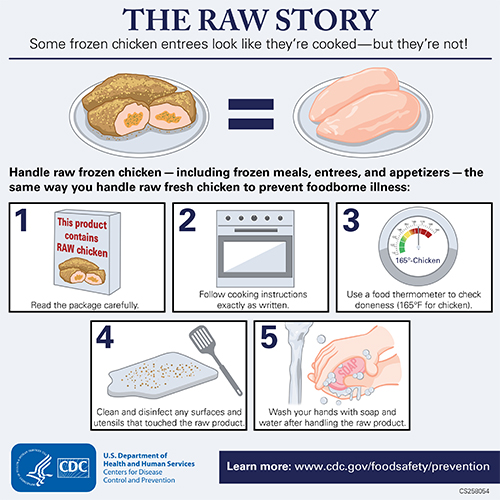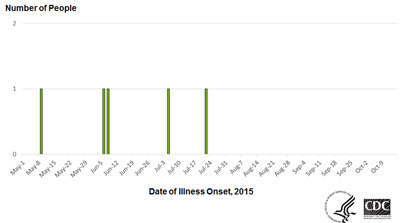2015 Salmonella Outbreak Linked to Raw, Frozen, Stuffed Chicken Entrees Produced by Aspen Foods
Posted October 16, 2015 2:00 PM ET
This outbreak appears to be over. However, the recalled frozen chicken products have a long shelf life and may still be in people’s freezers. Consumers unaware of the recall could continue to eat the products and potentially get sick. Read the Advice to Consumers.
This outbreak was not connected with an outbreak of Salmonella Enteritidis infections linked to raw, frozen, stuffed chicken entrees produced by Barber Foods and sold under many different brands.
- This outbreak appears to be over. However, the recalled raw, frozen, stuffed and breaded chicken products have a long shelf life and may still be in people’s freezers. Consumers unaware of the recall could continue to eat the products and potentially get sick.
- CDC, the Minnesota Department of Health, and the U.S. Department of Agriculture’s Food Safety and Inspection Service (USDA-FSIS) investigated an outbreak of Salmonella Enteritidis infections linked to raw, frozen, stuffed and breaded chicken entrees produced by Aspen Foods.
- Five people infected with two strains of Salmonella Enteritidis were reported from Minnesota. Two of these ill people were hospitalized, and no deaths were reported.
- The five illnesses in Minnesota occurred after people had eaten Antioch Farms brand frozen, raw, stuffed and breaded chicken entrees, which are produced by Aspen Foods.
- Several brands of frozen, raw, stuffed and breaded chicken entrees were recalled by Aspen Foods as a result of this investigation.
- On October 2, 2015, Aspen Foods issued an expanded recall of approximately 561,000 pounds of frozen, raw, stuffed and breaded chicken products that may be contaminated with Salmonella Enteritidis.
- On July 15, 2015, Aspen Foods issued a recall of approximately 1.9 million pounds of frozen, raw, stuffed and breaded chicken products that may be contaminated with Salmonella Enteritidis.
- A full list of recalled products are available on the Advice to Consumers page.
- As part of the ongoing investigation, on September 17, 2015, USDA-FSIS reported that frozen, raw, stuffed and breaded chicken entrees produced by Aspen Foods have been confirmed as having the outbreak strain of Salmonella Enteritidis. USDA-FSIS reported that it cannot have confidence in the safety of any of these products produced between July 30, 2015 and September 17, 2015.
- Consumers should check their freezers for the recalled frozen, raw chicken products and should not eat them. Retailers should not sell them, and restaurants should not serve them.
- CDC’s National Antimicrobial Resistance Monitoring System (NARMS) laboratory conducted antibiotic resistance testing on clinical isolates collected from three ill people infected with the outbreak strain.
- All three (100%) isolates were susceptible to all antibiotics tested on the NARMS panel.
Introduction
The Minnesota Department of Health (MDH) and Department of Agriculture (MDA), CDC, and the U.S. Department of Agriculture’s Food Safety and Inspection Service (USDA-FSIS) investigated an outbreak of Salmonella Enteritidis infections linked to frozen, raw, stuffed and breaded chicken entrees produced by Aspen Foods. This outbreak was not connected with an outbreak of Salmonella Enteritidis infections linked to raw, frozen, stuffed chicken entrees produced by Barber Foods.
Public health investigators used the PulseNet system to identify illnesses that were part of this outbreak. PulseNet is the national subtyping network of public health and food regulatory agency laboratories coordinated by CDC. DNA “fingerprinting” is performed on Salmonella bacteria isolated from ill people using techniques called pulsed-field gel electrophoresis (PFGE) and whole genome sequencing (WGS). WGS gives a more detailed DNA fingerprint than PFGE. PulseNet manages a national database of these DNA fingerprints to identify possible outbreaks. Two DNA fingerprints (outbreak strains) were included in this investigation. Because the outbreak strains of Salmonella Enteritidis included in this investigation are common in the PulseNet database, WGS was performed to help identify which illnesses were related to this outbreak.
A total of five people infected with the outbreak strains of Salmonella Enteritidis were reported from Minnesota.
Illness onset dates ranged from May 9, 2015 to July 22, 2015. Ill people ranged in age from 14 years to 68, with a median age of 30, and 60% were male. Two (40%) were hospitalized, and no deaths were reported.
Investigation of the Outbreak
Epidemiologic, laboratory, and traceback information indicated that frozen, raw, stuffed and breaded chicken entrees produced by Aspen Foods was the likely source of this outbreak.
MDH and MDA collected 30 samples of unopened Antioch Farms brand frozen chicken entrees produced by Aspen Foods from retail locations for laboratory testing. MDA isolated Salmonella from 25 of these samples. A review of the PulseNet database was conducted to identify any illnesses from strains of Salmonella isolated from these food samples. WGS determined that two Salmonella Enteritidis isolates from people in Minnesota were closely related genetically to one another and to an isolate from a food sample. During interviews, both ill people reported consuming Antioch Farms brand frozen, raw, stuffed and breaded chicken entrees produced by Aspen Foods in the week before their illness began. As a result of these findings, both ill people were added to the total case count for this outbreak.
On July 15, 2015, Aspen Foods recalled approximately 1.9 million pounds of frozen, raw, stuffed and breaded chicken products that may be contaminated with Salmonella Enteritidis. The recall included products sold under many different brand names, including Antioch Farms, and were shipped to retail stores and food service locations nationwide. The chicken products were produced between April 15, 2015 and July 10, 2015. The products subject to recall bear the establishment number “P-1358” on the packaging.
On September 17, 2015, USDA-FSIS reported that frozen, raw, stuffed and breaded chicken products produced by Aspen Foods were confirmed as having the outbreak strain of Salmonella Enteritidis. USDA-FSIS reported that it cannot have confidence in the safety of any of these products produced between July 30, 2015 and September 17, 2015. Products bear the establishment number “P-1358” on the packaging and have “best if used by” dates between October 29, 2016 and December 16, 2016. These dates were calculated by USDA-FSIS using production dates and the 15-month shelf life of the products.
On October 2, 2015, Aspen Foods issued an expanded recall of approximately 561,000 pounds of frozen, raw, stuffed and breaded chicken products that appear to be ready-to-eat and may be contaminated with Salmonella Enteritidis. The frozen, raw, stuffed and breaded chicken products were produced between August 25, 2015 and September 17, 2015 with “best if used by” dates of August 23, 2016 to December 15, 2016. The products subject to recall bear the establishment number “P-1358” inside the USDA mark of inspection, and were shipped to retail stores and food service locations nationwide.
The National Antimicrobial Resistance Monitoring System (NARMS) is a U.S. public health surveillance system that tracks antibiotic resistance in foodborne and other enteric bacteria found in people, raw meat and poultry, and food-producing animals. NARMS is a partnership among the CDC, the U.S. Food and Drug Administration (FDA), the U.S. Department of Agriculture (USDA), and state and local health departments.
The NARMS human surveillance program at CDC monitors antibiotic resistance in Salmonella and other bacteria isolated from clinical specimens submitted to NARMS by public health laboratories. CDC’s NARMS laboratory conducted antibiotic resistance testing on clinical isolates collected from three ill people infected with the outbreak strains. Of the three isolates tested, all (100%) were susceptible to all antibiotics tested on the NARMS panel.
This outbreak appears to be over. However, the recalled frozen chicken products have a long shelf life and may still be in people’s freezers. Consumers unaware of the recall could continue to eat the products and potentially get sick.

